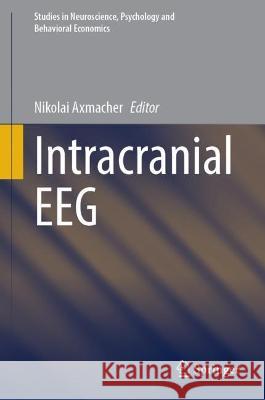Intracranial EEG: A Guide for Cognitive Neuroscientists » książka
Intracranial EEG: A Guide for Cognitive Neuroscientists
ISBN-13: 9783031209093 / Angielski / Twarda / 2023 / 1052 str.
Intracranial EEG: A Guide for Cognitive Neuroscientists
ISBN-13: 9783031209093 / Angielski / Twarda / 2023 / 1052 str.
(netto: 514,04 VAT: 5%)
Najniższa cena z 30 dni: 535,99 zł
ok. 20 dni roboczych.
Darmowa dostawa!
This book offers the first, comprehensive guide to planning and conducting intracranial EEG studies, and analyzing intracranial EEG data. The chapters address core questions in the field of intracranial EEG research. They are written by internationally recognized experts in the domain of intracranial EEG and acknowledge the heterogeneity of approaches in this field. The particular format of the book allows readers to find clear guidelines, hands-on expertise and invaluable background information for planning and conducting state-of-the-art intracranial EEG research projects. Besides offering a reference guide to newcomers in the field, it also provides scholarly information for the more experienced researcher and inspiration for the expert. The book covers a wide range of topics, with a special emphasis on aspects in which intracranial EEG data differ from other types of data in the cognitive neurosciences. It discusses typical patient characteristics and implantation schemes, ethical issues, and practical considerations for planning and running intracranial EEG experiments. It addresses signal characteristics and the physiological background of oscillatory and non-oscillatory aspects of intracranial EEG signals. It describes complex pre-processing steps such as advantages and disadvantages of different referencing schemes, and how to identify the location of electrodes. In addition, it answers specific questions on data processing, addressing core aspects of statistical analysis, and suggesting guidelines for data presentation. Further, it covers advanced topics such as causal interventions (i.e. deep brain stimulation), acquisition and analysis of single-unit data and multimodal recordings, and discusses important future challenges and opportunities in the field of intracranial EEG research.
This book offers the first, comprehensive guide to planning and conducting intracranial EEG studies, and analyzing intracranial EEG data. The chapters address core questions in the field of intracranial EEG research. They are written by internationally recognized experts in the domain of intracranial EEG and acknowledge the heterogeneity of approaches in this field. The particular format of the book allows readers to find clear guidelines, hands-on expertise and invaluable background information for planning and conducting state-of-the-art intracranial EEG research projects. Besides offering a reference guide to newcomers in the field, it also provides scholarly information for the more experienced researcher and inspiration for the expert. The book covers a wide range of topics, with a special emphasis on aspects in which intracranial EEG data differ from other types of data in the cognitive neurosciences. It discusses typical patient characteristics and implantation schemes, ethical issues, and practical considerations for planning and running intracranial EEG experiments. It addresses signal characteristics and the physiological background of oscillatory and non-oscillatory aspects of intracranial EEG signals. It describes complex pre-processing steps such as advantages and disadvantages of different referencing schemes, and how to identify the location of electrodes. In addition, it answers specific questions on data processing, addressing core aspects of statistical analysis, and suggesting guidelines for data presentation. Further, it covers advanced topics such as causal interventions (i.e. deep brain stimulation), acquisition and analysis of single-unit data and multimodal recordings, and discusses important future challenges and opportunities in the field of intracranial EEG research.











